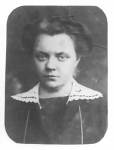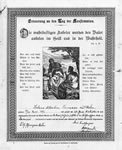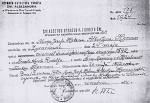| |
 | |
 |
Helena Albertyna Herman(s. Urszula from the Order of Sisters of the Name of Jesus)
The essay below is based on Helena's handwritten biography (not dated - probably from the time of her application for admission to the convent?), biographical note from the Monastical Order of Sisters of the Name of Jesus (short version - typewritten) and of its complete version (printed and referenced). Helena Albertyna (born - 24.V.1892, died - 19.V.1972) was raised in Zyrardow (see) in a family, which was of a "mixed" ethnic and religious background. Her father was a German protestant and mother - Polish, lutheran. However, her mother's father was of Italian origin and a catholic, while her mother was Polish and also a lutheran. Helena was baptized on May 26, 1892 (as was her older brother Albert) in a "kircha" (*) of the lutheran parish in Wiskitki (see map). In her biography, she writes that her parents, as well as her grandparents and the housekeeper were "not practicing", therefore she did not receive proper religious upbringing. She was raised predominatly by her grandmother. From early childhood, Helena demonstrated deep interest in religious matters. Together with her younger sister, they attended services in churches of various deniminations in Zyrardow - she was observing and was impressed by the behaviour ot the catholic children under various circumstances connected with the practice of their religion. She was also greatly impressed by the cult of the Virgin Mary in the Catholic Church. After the family moved in 1905 to Chelm Lubelski, Helena was confirmed in a lutheran church in Kamien, a place located 7 kilometers from Chelm. This was the nearest lutheran parish in that area. A Confirmation Certificate from that event, which took place on June 4, 1906 still exists (see below). was raised in Zyrardow (see) in a family, which was of a "mixed" ethnic and religious background. Her father was a German protestant and mother - Polish, lutheran. However, her mother's father was of Italian origin and a catholic, while her mother was Polish and also a lutheran. Helena was baptized on May 26, 1892 (as was her older brother Albert) in a "kircha" (*) of the lutheran parish in Wiskitki (see map). In her biography, she writes that her parents, as well as her grandparents and the housekeeper were "not practicing", therefore she did not receive proper religious upbringing. She was raised predominatly by her grandmother. From early childhood, Helena demonstrated deep interest in religious matters. Together with her younger sister, they attended services in churches of various deniminations in Zyrardow - she was observing and was impressed by the behaviour ot the catholic children under various circumstances connected with the practice of their religion. She was also greatly impressed by the cult of the Virgin Mary in the Catholic Church. After the family moved in 1905 to Chelm Lubelski, Helena was confirmed in a lutheran church in Kamien, a place located 7 kilometers from Chelm. This was the nearest lutheran parish in that area. A Confirmation Certificate from that event, which took place on June 4, 1906 still exists (see below). Helena was inconsolable after the death of her mother later in the same year 1905. After her father remarried in 1907, she and her sister returned to the grandmother in Zyrardow, where she resumed attending the russian-german school. During one of the religion classes, a lutheran pastor made an unfavourable remark about the Virgin Mary - Helen felt deeply hurt and offended. She stopped attending this particular class. At about the same time, she was helping a catholic girl with her homework (to earn some money and to help her grandmother financially). From that girl, she learned basic catholic prayers and how to say the Rosary.
Shortly afterwards, in 1908 she went to Riga (Latvia) on her brother Albert's invitation. While there, she took part in 1909 in Albert's wedding ceremony which was held in a roman-catholic church. She stated in her biography that that ceremony was a decisive event, which helped her to make up her mind and to convert to catholicism. She did that in secret, in spite of the very strong opposition from her family and in particular from her brother. She was baptized again on October 31, 1910, in a Roman-Catholic Church in Boldra. (At that tme, while changing the denominations, a second baptism was required. This requirement was abolished during the 2nd Vatican Council). At that time she received new christian names - Maria Jozefa. At the time of the repeated confirmation, she received a name - Teresa. After achieving the adulthood, and thus the right to decide for herself, in 1913 Helena entered the Congregation of Sisters of the Name of Jesus, "where, during the most of her convent life, she devoted herself to the education and upbringing of children and to the social, community welfare and charity work."
After completion of the postulantship and noviciate, during which she received a name - "Urszula of the Mother-of-God of the Sorrows" and after taking the vows, in 1916 she started working in a Shelter for Homeless Children (Zakład Wychowawczo-Naukowy) run by the Marian Fathers in Bielany near Warsaw. Starting in January 1919, she worked for a few months in a home for the orphans in Lublin. "Starting on September 1, 1919, during the next 38 years, with only a short intermission, she worked in the area of Klimontow (see) in the Sandomierz Diocese. (...) Her work was directly connected with the nursery, orphanage (St. Joseph's Home) and Girl's Trade School, ...".
During the 2nd World War, since October 18, 1941, she was a member of a Committee which provided assistance to the displaced families. The hiding Jews and partisans took advantage of this help. "In the St. Joseph's Home, she was hiding three Jewish girls: (named Iwona, Lucyna and Maria), owing to this help they survived." She maintained contact with the chaplain of a detachment of the A.K. (Home Army) and hid in the convent building some members of the A.K. Immediately after liberation of this area, she was named to the position of a director of the Voivodship (provincial) Division of the Office for Mother and Child Care in Kielce. She organized children homes for the abandoned children, among others in Sandomierz, Klimontow and Karpacz. Organized training courses for the education cadres. Later on, she was elected to a position of the stewardship in the General Administration (Headquarters) of the Order. She belonged to the Polish Teachers' Union.
"In 1956, she was summoned to the (Communist) Security Office for an interrogation regarding her 'ardour' in her ministry work." She held the rank of a Mother Superior of the House in Klimontow from 1956 until 1962 and during the period 1962 - 1964 was a Superior of the Noviciate House in Warsaw. After that, she returned to Klimontow, where she remained active in the life of the Parish and of the Congregation. She died on May 15, 1972 in Klimontow and is buried in the local cemetery.

Young Helena |

Confirmation
certificate |

Baptism and Parish
membership certificate
|

Celebration of 50 years
in the Convent |
* Quotation marks in the text above indicate excerpts from the handwritten biography or from the biographical notes of the Congregation. "kircha" - derived from German, a lutheran church, assembly.
We are very indebted to the members of the Congregation, and in particular to s. Kazimiera Jakobik and s. Barbara Konarska, for their understanding and their willing to help in the reconstruction of the family history, by providing the archival materials, as listed above - a heartfelt "may Heaven reward You"!
WJW
| Prepared by: Waldemar J. Wajszczuk & Paweł Stefaniuk |
|
|
 | |
 |
|
| |